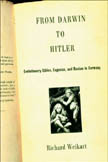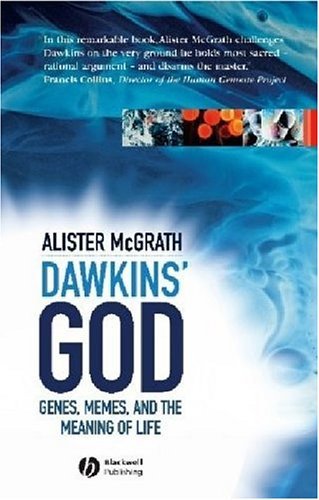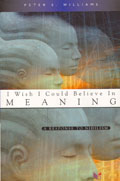
Access
Research
Network
|
|
Access |
ARN-Announce is the on-line announcement and information service of Access Research Network. ARN generates announcements to the current ARN Announce list as information becomes available. You have received this message because your email address was submitted to this list. Subscription and Unsubscription information is at the end of this message.
Click here for a text-only version of this document.
IN THIS ARN-ANNOUNCE:
New DVD lecture with Richard Weikart


Save 15% when you order the book and video.
A few months ago we announced Richard Weikart’s excellent new academic book linking evolutionary ethics, eugenics and racism in Germany from Hitler back to Darwin. This month we are releasing a companion ARN lecture video with Weikart on the same topic and offering a study kit bundle containing both the book and video lecture. This lecture was delivered at the University of California, Santa Barbara and received 2nd Place in the Templeton/ASA Lecture Series on Science and Religion for Best Video Lecture.
In his book, From Darwin to Hitler: Evolutionary Ethics, Eugenics, and Racism in Germany (2004) Richard Weikart explains the revolutionary impact Darwinism had on ethics and morality. He demonstrates that many leading Darwinian biologists and social thinkers in Germany believed that Darwinism overturned traditional Judeo-Christian and Enlightenment ethics, especially the view that human life is sacred. Many of these thinkers supported moral relativism, yet simultaneously exalted evolutionary "fitness" (especially intelligence and health) to the highest arbiter of morality. Darwinism played a key role in the rise not only of eugenics (a movement wanting to control human reproduction to improve the human species), but also euthanasia, infanticide, abortion, and racial extermination. This was especially important in Germany, since Hitler built his view of ethics on Darwinian principles. In the final chapter Weikart argues that Hitler was not amoral, but upheld a consistent ethic that rested on Darwinian foundations.
In the lecture Professor Weikart focuses on the significant impact Darwinism has had on morals and ethics, especially the undermining of the sanctity of life. He outlines six implications of Darwinism for devaluing human life:
About the Author
Richard Weikart is an associate professor of modern European history at California State University, Stanislaus. He has lived in Germany over five years, including one year on a Fulbright Fellowship. He has published two previous books, including Socialist Darwinism: Evolution in German Socialist Thought from Marx to Bernstein (1999), as well as articles in German Studies Review, Journal of the History of Ideas, Isis, European Legacy, and History of European Ideas.
This DVD lecture video provides a great overview of Professor Weikart’s research and you can save 15% when you order the study kit bundle with both the video and book.
To order From Darwin to Hitler video, book or study kit go to: http://www.arn.org/arnproducts/coverimages/v056sk.htm
New book by Alister McGrath
 Twenty five years ago Alister McGrath had just completed his PhD in molecular biology and an honors degree in theology and was getting ready to leave Oxford to do some theological research at Cambridge University. He received an invitation from Oxford University Press to write a response to Richard Dawkins recent book The Selfish Gene. He passed on the opportunity assuming there would be others just as qualified to take on the task. A quarter century later, no one has taken up the task, and Dawkins writings have become less about science and more a scientific polemic for the atheistic worldview.
Twenty five years ago Alister McGrath had just completed his PhD in molecular biology and an honors degree in theology and was getting ready to leave Oxford to do some theological research at Cambridge University. He received an invitation from Oxford University Press to write a response to Richard Dawkins recent book The Selfish Gene. He passed on the opportunity assuming there would be others just as qualified to take on the task. A quarter century later, no one has taken up the task, and Dawkins writings have become less about science and more a scientific polemic for the atheistic worldview.
This is the first book-length response to Richard Dawkins, who has become perhaps the world’s best-known atheist, noted for his hostile and controversial views on religion. This wonderfully argued book explains and examines Dawkins’ scientific ideas and their implications for religion and intellectual history. Head-to-head, it takes on some of Dawkins’ central assumptions, like the conflict between science and religion, the "selfish gene" theory of evolution, the role of science in explaining the world, and brilliantly exposes their flaws. McGrath treats Dawkins’ ideas with respect, and rather than declaring his opponent as vanquished on the first salvo, he sweeps away the strawman religious fundamentalist Dawkins’ seems to address in his writings, and forces him into a chess match of the intellectual Grand Masters. With Antony Flew’s recent defection from the ranks of British atheists, the stakes are higher than ever. It will be interesting to see how Dawkins’ responds to this worthy critique.
To order the book Dawkins’ God go to: http://www.arn.org/arnproducts/php/book_show_item.php?id=86
New book by Peter S. Williams
 In the first half of the movie Bourne Identity, Jason Bourne (Matt Damon) tries to figure out who he is after awakening with a severe case of amnesia. And once he figures it out, he discovers he is not so happy about the person he was. In his new book, I Wish I Could Believe in Meaning, Peter Williams uses this movie image as a metaphor for many young people today, who like Jason Bourne spend their time desperately going over and over a small number of clues to try and understand the meaning and purpose of their life.
In the first half of the movie Bourne Identity, Jason Bourne (Matt Damon) tries to figure out who he is after awakening with a severe case of amnesia. And once he figures it out, he discovers he is not so happy about the person he was. In his new book, I Wish I Could Believe in Meaning, Peter Williams uses this movie image as a metaphor for many young people today, who like Jason Bourne spend their time desperately going over and over a small number of clues to try and understand the meaning and purpose of their life.
In fact this book was, in part, a response to just such a question from a student, as well as a response to the popular writings of British scientist, Richard Dawkins. Dawkins claims that the nihilistic truth revealed to us by science is far superior to the alternative of throwing our brains away to believe in God. Williams disagrees with Dawkins’ assumption that theists must throw away their brains, and with his definition of science. In response he brings together the expert testimony of philosophers, theologians, and scientists, to build a carefully reasoned case for a theistic understanding of life as both objectively meaningful, and a better explanation of the ‘clues’ available to us at this time.
If you are of the opinion that nothing written by a philosopher can be understood by mere mortals, then you will be pleasantly surprised by this book. Williams extracts interesting nuggets of truth from great thinkers of the past and present and compares and contrasts them with familiar scenes from current TV shows and movies to make his points.
Have you ever wished you could believe in meaning and purpose in life? Or do you believe it, but can’t explain why? Have you been lured into the web of naturalism espoused by Richard Dawkins and others who claim life is the result of the purposeless random acts of nature? Then review the moral and aesthetic arguments presented by Williams, along with the evidence he summarizes for intelligent design from cosmology and biology. Then see if an answer comes into focus from the clues like it did for Jason Bourne.
Those who are looking to move beyond a general introduction to these topics will also find this book invaluable. The book includes extensive references and a bibliography with related websites, books and videos (including many references to resources on the ARN website).
Reviews
Anyone who thinks that truth, beauty and goodness might have been condemned without a fair trial should read this wonderfully insightful and encouraging book.
-- Angus Menuge, Professor of Philosophy, Concordia University
To order the book I Wish I Could Believe in Meaning, or to view the table of contents, go to: http://www.arn.org/arnproducts/php/book_show_item.php?id=85

Recently a friend and former patient of mine asked me over to talk to her about some progressive symptoms that she had been experiencing over the last several months. She had first noticed that occasionally she would lurch from one wall to the other while walking down a hallway. As these episodes continued, she also began to notice that if she closed her eyes in the shower she would become disoriented and lose her balance.
When I encountered all of these symptoms it became clear to me that her difficulties stemmed from some sort of dysfunction of the neuromuscular system. But exactly what and where was her problem?
To find out join me in this month’s web column as I explore the answer in Wired for Much More than Sound Part VIII: Run for your Life Part 1

EurekAlert reports that a team of applied mathematicians, physicists, and biologists from Harvard has discovered how the Venus flytrap snaps up its prey in a mere tenth of a second by actively shifting the curved shape of its mouth-like leaves. Their study, published in the Jan. 27 issue of the journal Nature, investigates the series of events that occur from the time the plant's leaves are stimulated to the time the trap is clamped shut.
When an insect brushes up against a hair trigger, the plant responds by moving water to actively change the curvature of its leaves. While exactly how the water is moved is not completely understood, the scientists observed that the deformation of the leaves, once stimulated, provided the means by which elastic energy was stored and released, creating a simple yet effective jaw-like movement.
Our news editor, Tom Magnuson, scours the internet to report interesting articles like this every month in the ARN In The News blog. To read more information on this and other interesting news stories go to: http://www.arn.org/blogs/index.php/3
All of the ARN products can be ordered through our web catalog store with secure credit card ordering. There you will find a description of each product and you may add as many products as you would like to the electronic shopping cart. The suggested donation for each item includes USPS Media Mail for North American orders, which typically arrive in 5-7 days. Overseas prices include Foreign Surface shipping which may take 4-8 weeks. For faster shipping please include an additional donation and request either USPS Priority or Foreign Air. If you provide your email address, you will receive an email receipt of your order. Place your order today online at www.arn.org (click the products links on the top menu bar). If you have any problems or questions, or would rather place your order by phone, call our toll free number at 1-888-259-7102 and our staff will be happy to assist you (or leave your order with our voice mail system if we are out of the office).
Special Note for Christmas Deliveries
Normally our orders are shipped out via USPS Media Mail. All U.S. orders received between now and Christmas will be shipped via USPS Priority Mail. If delivery by Christmas is important, you may want to order by phone and/or upgrade to overnight delivery–call our office for details.
ARN-Announce describes many of the upcoming events and new articles, books, videos and other resources on Intelligent Design. Please forward this message to several of your friends and colleagues to let them know about the resources available at Access Research Network (www.arn.org). Back issues of ARN-Announce can be found at www.arn.org/announce.htm
ARN-Announce is produced by Dennis Wagner (dwagner@arn.org)
Access Research Network is a non-profit organization dedicated to providing accessible information on science, technology and society issues from an Intelligent Design perspective.
Mailing Address:
Access Research Network
PO Box 38069
Colorado Springs, Colorado
80937-8069
Contact:
(719) 633-1772 voice
(719) 520-1241 fax
(888) 259-7102 toll-free order line
On the web:
www.arn.org
TO ADD YOURSELF TO ARN-ANNOUNCE:
Send an email to "ARN-Announce-request@arn.org".
The body of the message should consist of the word "SUBSCRIBE"
and nothing else. Or visit the web page at www.arn.org/announce.htm
and select Subscribe and enter your email address. You will receive
a confirmation email indicating your name has been submitted to the
list. Follow the directions and reply to the email and your email address
will be added to the ARN-ANNOUNCE list.
TO REMOVE YOURSELF FROM ARN-ANNOUNCE:
Send an email to "ARN-Announce-request@arn.org".
The body of the message should consist of the word "UNSUBSCRIBE"
and nothing else. Or visit the web page at www.arn.org/announce.htm
and select Unsubscribe and enter your email address. Your email
address will be automatically removed from this list.
Copyright 2005 Access Research Network. All rights reserved. International copyright secured.
01.31.05